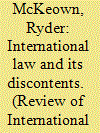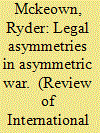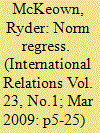|
|
|
Sort Order |
|
|
|
Items / Page
|
|
|
|
|
|
|
| Srl | Item |
| 1 |
ID:
153255


|
|
|
|
|
| Summary/Abstract |
International law is generally considered to be a good thing. With important exceptions, such as Critical Legal Studies, scholarship in both International Relations (IR) and International Law (IL) reinforces this ‘nice law’ assumption and therefore overlooks or underestimates the law’s negative aspects. In contrast, this article assumes the power of international law to examine how international law can have effects that are unintended, unhelpful, or even perverse. In particular, I argue that international law distorts policy- and decision-making processes in liberal democracies by eroding personal responsibility and decreasing accountability; legal expertise and legal virtues crowd out important virtues of statecraft and prudence while shrinking our capacity for sophisticated moral and political thought; and an excessive focus on law can lead to suboptimal foreign policy outcomes. Rather than law being a bad thing per se, I examine the significant strategic and moral limits of international law. This raises the need to lower our expectations of international law, carefully examine the relationship between power and international law, and political responsibility and legal ethics, and more fully embrace our own personal responsibility. The article closes by suggesting a research programme on the dark sides of international law from various theoretical perspectives.
|
|
|
|
|
|
|
|
|
|
|
|
|
|
|
|
| 2 |
ID:
139572


|
|
|
|
|
| Summary/Abstract |
Standard conceptions of the relationship between international law and war in International Relations (IR) mostly oscillate between the sceptical view that law is mostly irrelevant in times of conflict, and the optimistic view that law is a meaningful moral standard that effectively constrains violence. Modern asymmetric conflicts between liberal democratic states and non-state actors such as the Taliban, al-Qaeda, or Hamas challenge these conceptions, however, as they are at once increasingly legal and extremely violent. Drawing inspiration from IR and International Law (IL) scholarship from multiple theoretical paradigms, this article examines the legal asymmetries before, during, and after asymmetric conflict. Noting that law is at once a useful tool and a strong normative force, it argues that a good understanding of legal asymmetries can supplement existing theories of asymmetric war, continue the dissolution of false dichotomies and open up interesting avenues of research in IR, and help both scholars and policymakers understand how international law influences modern asymmetric conflict against non-state actors.
|
|
|
|
|
|
|
|
|
|
|
|
|
|
|
|
| 3 |
ID:
087457


|
|
|
|
|
| Publication |
2009.
|
| Summary/Abstract |
Is the norm against torture suffering a crisis of legitimacy within the United States, and if so, does this constitute a crisis in the norm itself? Can constructivist international relations theory explain how the norm came to be significantly weakened by its most important proponent? Constructivist literature on norms has hitherto suffered from a `nice norm bias' that does not adequately take into account the reversibility of so-called `internalized' norms like the one prohibiting torture. Through an examination of the rhetoric, policies and practices surrounding US interrogation after 9/11, this article addresses omissions in constructivist literature by providing a theoretical model to explain `norm regress', or the death of norms. It claims that the torture norm is suffering a crisis of legitimacy within the United States and any future incidences of torture by liberal states may well bring about a crisis of legitimacy in the international norm itself.
|
|
|
|
|
|
|
|
|
|
|
|
|
|
|
|
|
|
|
|
|